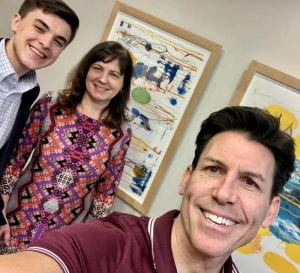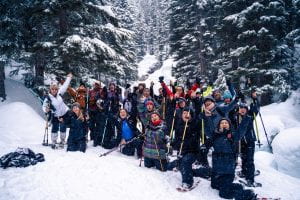By Jeffrey Asa-Hauser
For my STEP Project, I attended the MIT Sloan Sports Analytics Conference on March 6th and 7th. I attended talks on topics like the strategy and game theory of Jeopardy and Sports Analytics in Soccer. I also attended workshops for learning how to create your own Statcast metric and using JuMP with Julia to solve optimization problems.
I walked into this conference with absolutely no expectations. I was had always been one of the nerdier sports fans, and this convention ended up being a gathering of people like me. Only, most of these people had turned their love of sports and data into fulltime careers. There weren’t many hobbyists at the conference. It was filled with students and full-time sports analytics people. The conference was absolutely packed with things to do and speakers and panels I wanted to attend. In fact, there were quite a few hours when I wished I could have been at two or sometimes three places at once. Before attending the conference, I was hesitant about whether or not this would be a field I wanted to work in. The big takeaway for me at the end of the conference was that I was absolutely sure now that I want to go into the sports analytics field.
I also want to acknowledge that this conference took place right at the beginning of the COVID-19 outbreak in the United States, and state that despite the risks involved, I am happy that the conference took place just before large gatherings were stopped and that from the very beginning of the conference, we were all instructed to bump elbows instead of shake hands. I think everyone was at least slightly nervous about the outbreak of COVID-19 at the conference, but as far as I have heard, that wasn’t the case.
I had a number of impactful interactions at the conference, some longer than others. The first was a career conversations event that allowed me to speak with two people who worked in very different parts of the sports analytics world. One was a man who worked for the University of Nebraska’s Sports Analytics department and I discussed with him the ways in which undergrads can get involved in sports analytics. He gave me advice for how to best improve my resume while at Ohio State. The next person I talked to works for ESPN and was able to tell me more about how their company is planning to expand their analytics focused content and broadcasts. She also gave me good advice for how to stand out in the interview process and what people hiring sports data analysts are looking for.
The second impactful thing that happened was that I had a chance to speak one on one with Robert Hess, a FIDE chess Grand Master. I caught him just after his panel had ended and I got to ask him some questions about how the sports world can learn from chess and also pick his brain about how he visualizes chess boards when he gives a blindfolded simul. I came away from that conversations with a deeper respect for how the chess world works in terms of ratings and awarding their world championship, and also how the game of chess in many ways mimics life. The things that make you a good chess player are the same things that make you successful in anything you may pursue: preparation, the ability to look ahead, and always looking for ways to better your position.
Finally, I had a chance to go out to dinner with some people who worked in the industry. My BUSFIN 4242 professor also attended the conference and had been attending for the last few years. He knows a few people who go every year, including someone from the New York Islanders, and someone who works on a NASCAR drivers team, both of whom do analytics work. Going to dinner with them was a wonderful experience and allowed me to build a network in what is a very tight knit community. I also got to hear about the paths that they had taken to be in this line of work and it helped me understand that domain knowledge and technical ability are equally important, but that you can get them separately. Working in Machine Learning and a tech company and also just loving sports as a hoppy is excellent experience and I don’t need to strictly focus on sports analytics jobs right out of college.
Before this conference, I didn’t really know what I wanted to do. I still don’t. However, what I did learn is that sports analytics is definitely one of my top choices. The industry is full of similarly passionate people who want to use their knowledge and technical ability to allow them to make a living doing something they love. Some of these people could absolutely be making more money working for fortune 500 companies, but they love sports and have dedicated themselves to sports. As the end of college approaches and I start applying for a job, in the back of my mind will be the passions that I have and how they can help me make sure that I do something that I love.





